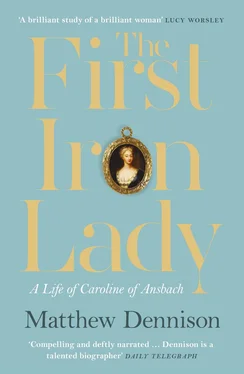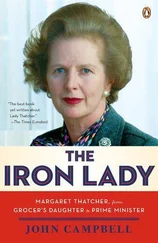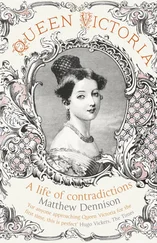As electoral princess, the Hanoverian equivalent of Princess of Wales, Caroline played a visual role in court ceremonial: her primary function was dynastic, a provider of heirs and progeny. That she was not present at Marlborough’s audience indicates the perimeters of her sphere of activity. For Caroline, the decade before Queen Anne’s death and the family’s move to London was overwhelmingly domestic in character. George Louis vigorously excluded George Augustus from politics. By continuing to oversee court entertainments, Sophia as effectively barred Caroline from key aspects of a consort’s role. 94With the exception of Sophia herself and Caroline’s favourite of Sophia’s ladies-in-waiting, intelligent, beautiful Johanna Sophia, Countess of Schaumburg-Lippe, afterwards Countess of Bückeburg, whose husband, like George Louis, preferred the company of his mistress, Caroline mostly lacked rewarding female friendship. She had little in common with rapacious and dreary Melusine von der Schulenburg; she knew enough of courts to maintain friendly relations with her father-in-law’s favourite and her ‘nieces’. Although Leibniz had been urged in 1705 to ‘cultivate her good qualities assiduously, for there you have a spirit naturally beautiful, and an intellect completely disposed to reason’, the philosopher’s frequent absences from Hanover meant Caroline also lacked intellectual stimulus. 95The period was not without its strains.
Her husband and her sister-in-law were her closest contemporaries. Neither had benefited from the irregularities of their childhood. George Augustus was splenetic, irritable and prickly in his self-esteem. In his grandmother’s eyes he lacked good sense. 96His aunt Liselotte attributed his bad temper to Duchess Eléonore’s inferior bloodlines; he was niggardly, boastful and, at moments of strain, intemperate. 97Toland excused his restlessness as ‘great vivacity’ of a sort that did not ‘let him be ignorant of anything’. 98An indifferent portrait by Kneller, painted in 1716, captures something of his Cock Robin self-regard. 99George Louis preferred his daughter. Superficial but spirited, Sophia Dorothea the younger shared her mother’s want of serious-mindedness. ‘All the pride and haughtiness of the House of Hanover are concentrated in her person,’ her own daughter wrote in the early 1740s, when Sophia Dorothea was in her fifties. She insisted her mother was ‘benevolent, generous and kind’, but also claimed ‘her ambition is unbounded; she is excessively jealous, of a suspicious and vindictive temper, and never forgives those by whom she fancies she has been offended’. 100
If even part of this assessment was true in 1705, Caroline can hardly have found proximity easy. She was closer in temperament to the dowager electress, whose interests resembled Figuelotte’s, but the two women initially saw little of one another. George Augustus’s early attentiveness to Caroline was marked. ‘The peace of my life depends upon … the conviction of your continued affection for me,’ he would write to her. ‘I shall endeavour to attract it by all imaginable passion and love, and I shall never omit any way of showing you that no one could be more wholly yours.’ 101He did not conceal his preference for her company above that of the court, and he and Caroline spent as much time as possible together. As late as May 1712, an English agent reported, ‘the Court is all gone to Herrenhausen for the whole summer, only the Prince electoral and his wife the princess remain here’. 102Such uxoriousness – influenced in part by the aimlessness of George Augustus’s life, which George Louis ensured lacked official responsibility – inspired mixed reactions, including in Caroline herself. Liselotte dismissed her nephew’s cosy behaviour as inappropriately unprincely, another malign legacy of non-royal Duchess Eléonore. 103Within weeks of their marriage Sophia wrote to Baron von Schütz, ‘I have never seen a lovelier friendship than that between the Prince Electoral and his wife. It appears as if they were made for one another, which causes us great joy.’ 104But, despite earnest protestations of devotion, the prince struggled to suppress argumentative instincts.
Whenever possible, Caroline sought out fleeting opportunities for time alone with Sophia at Herrenhausen. Their shared interests were wide-ranging and included philosophy, music and politics. During these first months of adjustment, disjointed encounters placed even this relationship under strain. Sophia’s letters to Liselotte make clear her frustration and disappointment: Caroline’s presence failed to staunch the older woman’s grief for Figuelotte, and the new electoral princess was cast firmly on her own resources. She oscillated between gratitude for George Augustus’s attachment and the need to cultivate, or indeed placate, others of her new family. Reading and singing offered her an outlet of sorts. Like Sophia she took lengthy walks in the palace gardens. In 1711, Handel wrote a set of twelve chamber duets for Caroline, described by his first biographer in 1760 as ‘a species of composition of which the Princess and court were particularly fond’. 105That Caroline hazarded the challenging soprano part is testament to the success of the singing lessons begun in her childhood at Ansbach by Antonio Pistocchi. 106
A phantom pregnancy during the first year of her marriage, reported by Sophia as early as November, indicates Caroline’s anxiety to provide the necessary heir. 107At twenty-two she could anticipate more than a decade of childbearing; it was George Augustus’s determination to play his part in the long-running War of the Spanish Succession that contributed a note of urgency. Supported by his privy council, George Louis had consistently thwarted his son’s military aspirations. To date the latter’s nearest approach to the theatre of war was a journey to the Dutch palace of Het Loo, undertaken in the autumn of 1701 with his grandfather, the Duke of Celle, as part of William III’s efforts to create a coalition against Louis XIV. Following his marriage, George Augustus again requested permission to join the fight against the French. ‘The court is against it and will not give their consent to let him go into the field until he has children,’ noted a British envoy. 108Repeated prohibitions failed to depress his ardour. Instead his resentment of his father mounted, adding a further note of asperity to a fissured relationship, with inevitable implications for Caroline.
On 31 January 1707, despite gainsayers who attributed her increasing girth to distemper or even wind, and ‘the court having for some time past almost despaired of the Princess Electoral’s being brought to bed’, Caroline succeeded in her primary task. 109Early in the evening, with the windows shuttered against the cold and the doors barred to court flunkeys, she gave birth to a delicate-looking baby boy, Frederick Louis. Unusually – and ill-advisedly, given speculation that Caroline’s pregnancy was once again imaginary – only a midwife and the court surgeon, de la Rose, were present at the birth in the Leineschloss. Responsibility for this break with tradition lay with George Augustus, whose concern was for Caroline’s comfort. His actions irritated the British envoy Emmanuel Scrope Howe and, in the absence of the usual crowd of official witnesses, facilitated lurid rumours that the baby’s father was not George Augustus but one of George Louis’s Turkish valets. Portraits of the prince throughout his life refute such spiteful calumnies. Lady Mary Wortley Montagu afterwards noted in Frederick ‘the fine fair Hair of the Princesse’ and ‘an Air of Sprightliness’ reminiscent of George Augustus’s volatile fidgetiness. 110Introduced to her first great-grandchild at the perfunctory service of baptism held in Caroline’s bedroom two weeks later, Sophia commended both his liveliness and his laughing eyes; erroneously she described him as ‘strong and robust’. 111She stood as one of three godparents, all of them members of the baby’s immediate family.
Читать дальше












